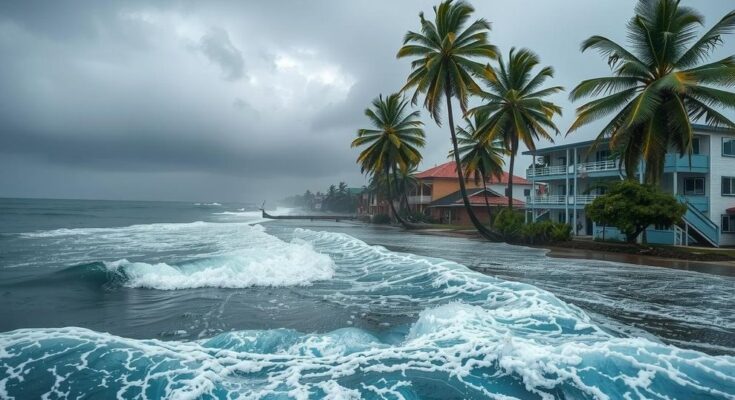Tropical Cyclone Chido made landfall on 15 December 2024 in Cabo Delgado, Mozambique, affecting over 380,000 people, damaging more than 61,500 homes, and leading to 76 deaths. WFP and partners have begun providing emergency food assistance, reaching 23,000 individuals despite access challenges.
Tropical Cyclone Chido struck the district of Mecufi in Cabo Delgado, Mozambique, on 15 December 2024, leading to widespread destruction and significant humanitarian challenges. This Category 4 cyclone unleashed winds reaching 180 km/h, coupled with torrential rainfall exceeding 200 mm in a single day. As emergency assessments continue to reveal the disaster’s impact, over 380,000 individuals have been reported affected across the Cabo Delgado, Nampula, and Niassa provinces. This includes the destruction of 61,500 homes, damage to 52 healthcare facilities, and acceleration of educational disruptions with 250 schools and 1,126 classrooms impacted. Protective measures taken by the Ministry of Health report the unfortunate loss of 76 lives and leave 768 others injured. In response, the World Food Programme (WFP) quickly mobilized to provide emergency food assistance to 500 families in Pemba within just 24 hours of the cyclone’s landfall. Operational structures transitioned to ensure continued humanitarian food distributions, with support from agencies including IOM and UNICEF, impacting a total of 23,000 individuals thus far. Despite operational challenges, including blocked access in the Mecufi district, recovery efforts are ongoing and crucial for the affected population.
Tropical Cyclones pose significant threats to the coastal regions of Mozambique, often leading to devastating humanitarian crises. The recent occurrence of Cyclone Chido exemplifies this danger as it affected a large number of people in the northern provinces of Cabo Delgado, Nampula, and Niassa. The cyclone not only damaged infrastructure but also severely impacted essential services including health and education, compounding the vulnerabilities faced by these communities. Humanitarian agencies are swiftly responding to the needs of those impacted, leveraging local and international partnerships to mitigate the effects of such disasters and provide emergency relief.
In conclusion, Tropical Cyclone Chido has resulted in a catastrophic humanitarian situation in northern Mozambique, affecting hundreds of thousands of individuals and leading to substantial damage to infrastructure and essential services. The prompt response from organizations like the WFP, in collaboration with other agencies, underscores the urgent need for coordinated emergency assistance and ongoing support for recovery efforts in the aftermath of this natural disaster. Continuous assessments are vital in addressing the unfolding needs of communities, ensuring they receive the necessary aid and support.
Original Source: reliefweb.int




